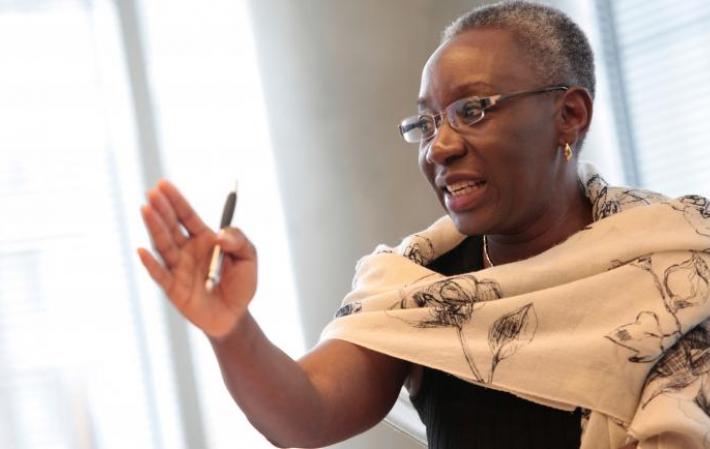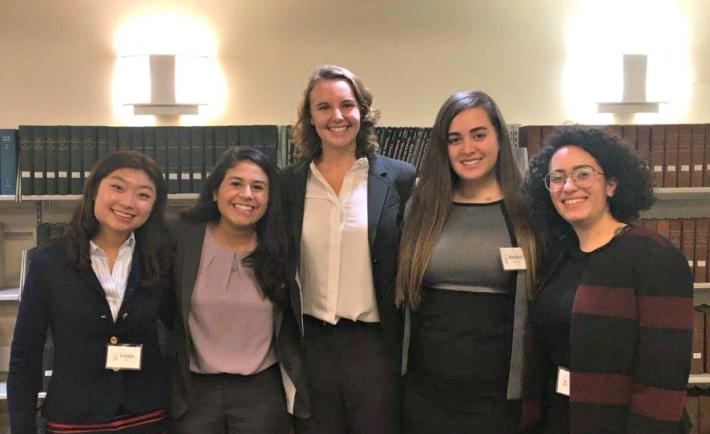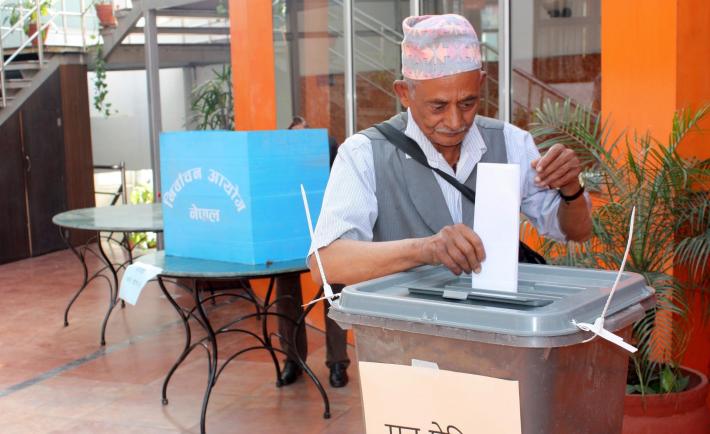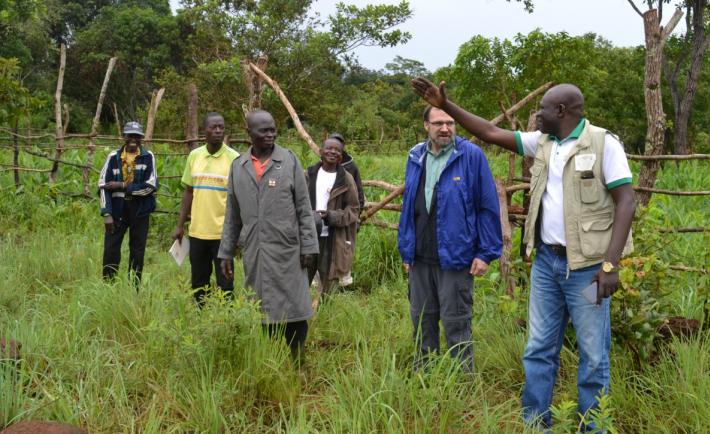
Sandra Pepera, Senior Associate and Director for NDI's Gender, Women and Democracy team.

Yes, that’s a cat in giant cat-foot slippers. Read the story to learn why it’s (vaguely) relevant to AI.
Artificial Intelligence is one of those buzzwords in tech that everyone’s heard, but few people actually understand how it can be used in practice. If you’re to believe Hollywood or Stephen Hawking, AI either means androids that are indistinguishable from humans (except for the inability to use conjunctions) or super-intelligent computers that could spell the end of the human race. After attending a Tech Salon on how AI can be used in international development, I can say with absolute certainty that it is neither of those things… yet. But the “commodification” of AI is making “smart automation” -- a term I quite liked as a useful synonym for AI -- much more accessible outside Silicon Valley. In fact, you probably already used some form of AI today without even knowing it.

This multidisciplinary group from the Madeleine K. Albright 2017 Fellowship at Wellesley College comprised two economists, an environmental scientist, a mathematician and a neuroscientist and presented on trade-induced inequalities.
When people think about gender inequality, they very rarely think about the effects that it has on a cognitive level. In fact, the gap between the natural and social sciences has grown so wide that advancements in both fields, which could benefit one another, end up lost within their specific bubbles. Bridging the gap between these two fields makes us all better equipped to tackle the greatest challenges that affect humanity.

A political party participant casts his vote during a mock election exercise on April 25, 2017 in Nepal. Through mock elections, candidates familiarized themselves with the voting process in order to conduct more effective voter outreach.
Since the end of its brutal decade-long civil war in 2006, Nepal has undergone a rocky, but peaceful democratic transition. The country has transitioned through the dissolution of its monarchy, the restoration of parliament, a devastating earthquake, the adoption of a new constitution, and the establishment of a federal republic. However, persistent poverty, the geographic isolation of many villages, and the marginalization of certain ethnic communities pose severe challenges to the nation’s economic and political development. Since the adoption of a new constitution in September 2015, significant progress has been made to improve government effectiveness, increase social inclusion and cohesion, and increase the responsiveness of the country’s representative institutions such as parliament and its political parties. Through on-the-ground engagement at each step in this time of change, NDI has worked to ensure that Nepali democracy reflects what matters to citizens, most recently in the country’s watershed local elections.
Happy International Youth Day! I remember watching President John F. Kennedy’s 1960 inaugural address. “Ask not what your country can do for you, but what you can do for your country,” he said. As a teenager, those words had a profound impact on me, and they still resonate today. Most people who dedicate their lives to public service can tell a similar story of inspiration -- an epiphany that drove them to change their communities for the better. But going from inspiration to action can be daunting. Many young people who are inspired to make a mark on their communities don’t feel like they have the support or know-how to get started.

Alain Kinzinguere of NDI partner the Central African Human Rights League (right, gesturing) discusses the benefits of a community-built stockyard (background) with the village chief of Damara (left center in coat).
For more than a year after President Faustin Archange Touadera’s surprise runoff victory, the Central African Republic has been consolidating its nascent democratic institutions, including new ones called for in the 2015 constitution. In contrast with previous governments and legislatures that resulted from flawed elections, no elections, or coups d'etat, Mr. Touadera and the elected National Assembly appear to enjoy popular legitimacy—for now.
This legitimacy, however, is now undergoing its first serious test. A recurring theme I heard from Central Africans during a recent visit is that they expect their political leaders and the international community to put an end to the rising violence committed by armed groups in 14 of the country’s 16 provinces.
Growing up, I dreamed of playing professional sports. When I first met a person who used a wheelchair like me and was a competitive athlete, I felt like I could do anything. Even if I had not made it to the Paralympic level, knowing that there existed a place where my disability and I were explicitly welcomed was heartening. The same is true at NDI. Inclusion is at the crux of what we do, whether it be with youth, persons with disabilities, LGBTI persons, or ethnic and religious minorities. When NDI and its partners explicitly talk about the importance of inclusion, it resonates with those who often feel excluded. NDI, and organizations like NDI, that take inclusion seriously and embrace it in their work are a source of hope for those of us in the disability space who can, at times, feel invisible. I can say from first hand experience, that true inclusion really does change lives.
Northern Niger has long been marked by instability and tense relations between citizens and the government, including military forces. The Agadez and Tahoua regions, which harbor the country’s vast uranium resources and most important mining sites, have repeatedly experienced conflicts among traditional pastoralist societies, growing urban communities, mining companies, and central authorities over issues such as the use of land and water resources and the environmental impact of the mining industry. These challenges have been exacerbated by an increasingly volatile security situation in the Sahel -- an arid region of Sub-Saharan Africa south of the Sahara desert. At the crossroads of century-old trade routes, Agadez has become a center for the trafficking of migrants to Europe, arms and drugs. Since the eruption of Mali’s armed conflict and increased incursions of Islamist terrorists into Nigerien territory, the government of President Mahamadou Issoufou has stepped up the presence of military forces in the north. Meanwhile, many citizens feel disenfranchised and frustrated over what they perceive as the government’s failure to provide basic services. Prior to Niger’s February 2016 legislative elections, NDI organized a series of forums where citizens discussed the priorities in their communities with political parties and their local candidates.The forums and ensuing meetings revealed increasing tensions between Niger’s military and the population in the area.

How to get to YES: a venn-diagram can be a useful tool to formulate areas of agreement among opposing sides during intense negotiations.
Ending ethnic conflict, opening up the economy, creating jobs and adopting constitutional reform are very large tasks looming in Burma’s future. Building consensus with minority parties also will be critical for the big changes that the Burmese must enact. But it would be a mistake to bet against a country of such beauty and tremendous natural resources, which welcomes you with a warm mingalaba (how are you doing!) greeting in each encounter.
Today’s youth are at a critical juncture. The current young generation - the largest in global history - is disproportionately affected by unemployment, insufficient access to education, violent conflict and a number of other challenges. Eager to play a role in changing their communities and nations for the better, many young people have become frustrated with political processes that seem out of reach, out of touch and ineffective, and have since turned to other ways to give back to their communities. To encourage youth to “opt-in” to the state, governments need to give them more than a seat at the table to address matters affecting their lives. Failure to do so may further widen the growing rift between youth and political institutions, and make youth more vulnerable to recruitment by extremist groups.
Youth in Lebanon have not had much opportunity to learn about democracy or how they can be involved in democratic governance. NDI conducted a survey in April 2017 suggesting nearly one-third of the electorate has never voted in parliamentary elections—not because they do not want to, but because parliamentary elections have not been held in the eight years since they became eligible to vote. Yet, despite the challenges they face, many young Lebanese men and women are highly motivated to act to improve their living conditions and basic rights.